- Home
- Christine Wenger
Do or Diner: A Comfort Food Mystery Page 2
Do or Diner: A Comfort Food Mystery Read online
Page 2
Mr. Farnsworth walked to the cowboy’s side. “Trixie, this is Mr. Tyler Brisco. He’s all the way from Houston, Texas, and he’s renting the apartment above my shop. Ty, Trixie is the new owner of the Silver Bullet.”
The cowboy held out his hand. “I guess that makes you my neighbor, Mrs. Matkowski.”
His voice was low and gravelly and incredibly sexy with a hint of a drawl, not that I’d noticed. I moved my grape sucker to my left hand and held out my right.
We shook hands, my purple-mittened hand in his. I hoped that it wasn’t sticky.
“Just call me Trixie. And I’m not a Mrs. anymore. Just Trixie. Trixie Matkowski. I took my maiden name back after my divorce.” Why on earth did I find it necessary to tell everyone about my divorce? I changed the subject. “I didn’t know that there was an apartment up there.”
Mr. Farnsworth nodded enthusiastically. “Yeah, your uncle Porky helped me renovate it a while back.”
I couldn’t take my eyes off the Texas cowboy. “How long have you lived in Sandy Harbor, Mr. Brisco?”
“Call me Ty.” With his drawl, those three simple words lasted forever. His smile was warm and infectious. “I moved in just after the first of the year.”
His voice was so mesmerizing, I’d listen to him read the Silver Bullet’s dinner menu. I jerked back to reality, and my reality was to concentrate on my new business ventures, not a Texas cowboy.
“So we’re both new to Sandy Harbor. What brings you here, Ty?”
I told myself that I was just making conversation, that I really didn’t care what he was doing here.
“I’d had enough of big-city crime,” he said. “You know, I’m just going over for lunch at the Silver Bullet. Join me and we’ll talk?”
His eyes twinkled, and I wondered if he knew how sexy he actually was. Of course he did. A guy as good-looking as Ty had women stacked up like cordwood.
I wasn’t going to be one of them. No, thanks.
But I was headed over to the diner anyway, wasn’t I?
“Uh…I’d love to join you, but I’m a bit busy right now,” I finally answered.
Mr. Farnsworth butted in. “Trixie, go and keep Ty company. There’s nothing that can’t wait. We take things a little slow here in Sandy Harbor.”
Oh great. I was trapped into having lunch with the cowboy.
I pulled out my notebook and a pen from the recesses of my coat. I’d take the opportunity to jot down some ideas I had for making the diner my own.
“What do you say, Trixie?” the cowboy drawled again, and my knees turned to mashed potatoes. My two-syllable name took on a life of its own.
Reluctantly I nodded. At another point in my life, maybe fifty years from now, I wouldn’t mind spending time with the cowboy. He might be interesting to get to know, but right now, all I could think of was that he was a man, and I was in a world of hurt, courtesy of Deputy Doug.
“I eat all my meals at the Silver Bullet.” Ty patted his flat stomach. “I think I’ve gained sixty pounds since I moved here.”
Yeah, right, cowboy.
I pulled out a crumpled tissue from the pocket of my coat and wrapped it around what was left of my sucker. I probably had purple teeth and tongue, but I didn’t care.
We went outside, walked around the boat launch between the diner and the bait shop, and cut through the launch’s empty parking lot to the back door of my diner.
“Let’s cut through the kitchen this time, Ty. I want to check on the cook.”
“Juanita?”
The man even knew the name of the morning cook. “You do come here often, don’t you?”
I smiled and waved to Juanita, whom I’d met briefly when she came to the Victorian to say good-bye to Aunt Stella.
“Everything okay?” I asked.
Juanita gave me a quick nod, and we hurried to the front of the diner to get out of her way.
I just loved the kitchen. Everything was aluminum or chrome and just shone. The smell of bacon frying permeated the air as did bread taking a ride on the toaster. Aunt Stella always called the revolving toaster a Ferris wheel for bread. I could just picture Uncle Porky at the cast-iron stove, working several orders at a time.
A good crowd was already gathered at the diner, but there were at least two booths available.
“Over there?” I pointed to the booth toward the back.
“Lead the way, darlin’.”
“I’m not your darlin’,” I mumbled. Doug used to call me darling. It rang hollow even then.
“Pardon me?”
“I said, ‘I love this diner.’”
A hush fell over the patrons, forks stopped moving, and it seemed like every pair of eyes looked in my direction. Several customers—mostly women—smiled and waved.
Happy to be recognized after all these years, I did the same back.
Then I realized they weren’t greeting me. It was all for Ty Brisco.
Glancing back at him, I saw that he was waving and tweaking his hat. The women were swooning.
Good grief.
I shed my bulky coat and hung it from a post on the side of the red vinyl booth. Good riddance to it, for a while anyway. I unraveled the scarf from my head and neck and patted down my hair. It was loaded with static electricity. Adjusting my brightly striped sweater, I slid into the booth.
Ty slid in across from me, took his hat off, and deposited it on a hook by my coat.
He had hat hair, but I had to admit that it looked good—like he’d just walked out of the shower and hadn’t had a chance to tame it yet. Brown with some reddish highlights that the fluorescent lights of the diner were picking up, it was longer on top than on the sides.
As I settled in, I looked around the diner. The white and black checkered floor needed some repair, but it could wait. I loved the mirror behind the counter. It made the place look bigger. What I loved the best was the revolving pastry fridge. As a kid, I could watch the cakes and pies going by for hours at a time, trying to decide what I’d like for dinner.
The chatter inside the diner signified that everyone was having a good time. A waitress walked around with two pots of coffee—regular and decaf—and I could smell more coffee brewing. A waitress I hadn’t met yet appeared with two menus and two glasses of ice water.
“Good afternoon. I’m Nancy. Welcome to the Silver Bullet Diner, the place for good food since 1950.” She addressed the entire speech to Ty and didn’t even glance in my direction.
“Hi, Nancy.” I held out a hand to her. “I’m Trixie Matkowski.”
“Oh!” She moved her order book over her mouth to hide a gasp. “You’re the new owner?”
“Yes, but don’t let me make you nervous.” I set my un-shaken hand down on the table.
“You won’t.” Nancy shook her head, and then tilted it toward Ty. “The daily special for you, Ty?”
“What is the special?”
“Monte Cristo sandwich. Ours is a ham, chicken, and cheese sandwich that’s dipped in egg and fried like French toast.”
He handed her the menu. “Sounds perfect. And a cup of coffee.”
She broke into a big grin. “Hot and black and thick enough to float a horseshoe.”
He nodded. “You’ve got it, Nancy, darlin’.”
She giggled and turned to leave, but when I loudly cleared my throat, she realized her mistake.
“I’ll have the same thing—the Monte Cristo special and coffee. Only I’ll take my coffee with cream.”
“Got it.” Nancy scribbled on the pad, then grinned stupidly at Ty.
What was wrong with some women?
Although I could appreciate a studly looking man, I wasn’t in the market for a relationship. Ty was simply one of my neighbors, and I was going to be nice and treat him as such.
I crossed my arms and leaned forward on the table. “So how did you land in Sandy Harbor, Ty?”
“I used to come here when I was a boy. Salmon fishing. My grandfather, father, and I. We always rented Cottage Number
Four for a week, and we always had a fabulous time—just us men. I felt so important, taking a week off from school.”
He had a brilliant smile, darn it.
He continued. “So when things got to me in Houston, I decided to move to the place that I’ve thought about the most throughout the years. Here.”
Looking out the window at the boat launch, I could imagine the three Houston cowboys rolling out their boat to go fishing.
Nancy set his coffee down carefully, and she was rewarded with a wink of a blue eye. My coffee slopped onto the saucer as she sped away.
“Can you believe that your aunt Stella remembered me after twenty years?” he asked me.
When he smiled, his whiter-than-white teeth gleamed, and the laugh lines at the corners of his eyes deepened, but I wasn’t noticing.
I nodded. “There weren’t many people she forgot.”
His cell phone went off, and he slid it from a clip on the waistband of his belt. Making a face when he studied the number, he then looked up at me.
“Sorry, Trixie, I have to take this.”
“Go ahead.”
He mostly grunted and made some garbled comments. Suddenly, he stood, grabbed his hat, and put it on. He reached into the pocket of his jeans, pulled out a wad of bills, and peeled off several.
He smiled. “We’ll have to try this again sometime. I gotta go. Duty calls.”
I was curious. “What duty is calling you?”
“The Sandy Harbor sheriff’s department.”
My throat tightened. “Please tell me you’re a criminal and not a cop,” I ordered.
He raised an eyebrow. “I’m a deputy sheriff.”
“You’ve got to be kidding!” The words tumbled out before I could bite them back. I had a flashback to Deputy Doug and could hear the crackle of his official radio.
Ty raised a perfect brown eyebrow. “Kidding?”
“Nothing. Really. Nothing. Um…lunch is on me.”
I didn’t want him to think of this as a date or something like that. Also, I owned the place, so lunch was on the house. I pushed his money toward him, but he shook his head. I left his money as a tip for Nancy.
He tweaked his hat, pivoted on his boots, and walked away.
Yes, he was definitely born to wear jeans. Not that I cared. Not now, especially not now.
The Monte Cristo specials appeared. As I dug into my meal, a visibly disappointed Nancy packed Ty’s into a white foam container.
Finally alone, I made some notes in my notebook: “get estimates for floor, fancier garnishes on plates other than lettuce leaf and tomato, lightbulb out behind counter, offer chicken or turkey on Monte Cristo.” Leaning back into the worn red vinyl seat cushion, I looked out the window.
Then a bloodcurdling scream came from the kitchen.
Chapter 2
I leaped up from the booth, hurried up the aisle, and pushed the silver double doors that opened to the kitchen.
Scanning the room, I didn’t see anything out of order—well, other than Juanita standing on the top rung of a step stool. She brandished a bread knife in her hand like a medieval knight with a sword.
“Juanita? What? Are you all right?”
“M-mouse.”
I took several deep breaths and hoped that my heart would stop pounding in my ears and slide back into my chest where it belonged.
Max and Clyde, the handymen whom I’d met earlier, were chuckling by the back door. Juanita pointed the knife at them and swore in crystal-clear English.
I glanced uneasily at the pass-through window to the front of the diner, hoping that Juanita’s swearing couldn’t be heard over the clinking of the silverware and the murmur of voices in conversation.
“He was this big,” Max said, holding his palms apart widely.
“Bigger,” Clyde teased.
Then a string of Spanish phrases, probably not G-rated, hung in the air next to her English cursing, just like the instructions that came in every do-it-yourself project.
I held out a hand to take the knife from her. She bent down and carefully gave it to me. Then she stood, crossed her arms, and shook her head. “Where is the mouse?”
“Godzilla is in the Dumpster,” Max said.
Juanita pinched her lips into a tight, white line, yet her eyes twinkled at their joking. “Please get to work,” she said. “Adios.”
“I second that, gentlemen,” I said. “There’s a lot of work to do around here to get ready for spring. So, please get to it. Or clear more snow.”
Like a pair of children who’d just been chastised, they hung their heads and left the kitchen. But Clyde gave Juanita a sideways glance, and his expression told me that they weren’t a bit sorry for teasing her.
I held out my hand to Juanita, this time to help her down. She took it and backed off the step stool as regally as a queen.
“I don’t like mice,” she said.
“I don’t like mice either—not where I eat, anyway.”
She smoothed her pristine white apron, shaking her head. “Max and Clyde—they smoke. They smoke too much. And they open and close the back door all day long. They come in. They go out. And the mouse, it come in.”
“Have you ever had a mouse in here before?”
“No. No mouse. Never.” Juanita scooped up the knife again and began slicing a loaf of Italian bread.
I wondered for a moment if there really had been an actual mouse or if Max and Clyde were just playing a joke on Juanita and she’d fallen for it.
What was this? Fourth grade?
“I’ll speak to them,” I said, with more authority than I felt.
“Never mind. I quit.” Juanita shrugged.
Something drained out of me—my sanity.
“Juanita, I need you.” As much as I wanted to roll up my sleeves and start my life as a short-order cook at my own diner, I was just too tired for a baptism of fire. I wanted to gently glide into the kitchen and observe, study, learn, eat.
And stall, just a little longer until I got my bearings.
I put a hand on her shoulder. “I promise to talk to them and tell them that their teasing isn’t welcome, but don’t let them drive you away. Aunt Stella told me that you’ve been here a long time.”
“Seven years.” She smiled, standing taller. “Ever since I moved to Sandy Harbor.”
“And you like it here?”
She nodded.
“And how many times have you threatened to quit because of Clyde and Max?” I guessed that their pranks had been ongoing.
“More times than I can count.”
“Aah.” I was right. “Are you going to let them drive you out of a job that you like?”
“No.” She pulled one of the orders from a metal clothespin, studied it, and pulled a sub roll from a plastic bag. She pointed it at me. “You talk to them. Now, out of my kitchen.”
I was just about to tell her that this was my kitchen, but I would quit while I was ahead.
Then it hit me. What was I going to tell the customers out front? I mulled that over for a while. If they found out that the Silver Bullet had a mouse—or mice—running around the kitchen, my new diner might become a ghost town.
I took a deep breath and pushed on the swinging metal doors. When I walked out in the front dining area, every pair of eyes met mine, staring and waiting.
I was confident that I could lie. After all, I learned from the best: my ex.
“Um…Juanita was listening to the radio—the weather report,” I announced. “She heard that we might have six more inches of snow. I guess she just fell apart.”
The patrons nodded, made comments in agreement, and went back to their meals. They could identify with Juanita. Like everyone in the Northeast, they all felt like screaming at Mother Nature. Enough snow already. Everyone—and I was no exception—wanted spring.
Spring brought the fishermen. Summer brought the families, the boaters, the tourists, and more fishermen. Fall brought the salmon and more fishermen. Winter brought th
e snowmobilers, cross-country skiers, and townspeople who had cabin fever.
And everyone would be hungry and would need to be fed. I hoped that the Silver Bullet would be hopping.
I needed to be ready.
And then there was that balloon payment to Aunt Stella due on Labor Day. I didn’t want to touch what was left of Wendy’s “get out of Philly” money to pay Aunt Stella. I wanted the Silver Bullet Diner and the Sandy Harbor Guest Cottages to make a profit as a result of my own hard work and creativity—just to show myself that I could do it.
I slid back into the booth and took a bite of my cold Monte Cristo. To her credit, Nancy appeared again and volunteered to heat it up for me. I thankfully handed her the plate.
I went back to my notes, but I couldn’t concentrate and found myself staring outside instead. Max was running the snowblower, clearing a path from the diner to the parking lot where the snow had drifted. Clyde was using a shovel on the stairs and sprinkling some kind of deicer on the steps to melt the snow. I remembered that salt wasn’t used around here due to environmental issues.
Looking left, I noticed a food-delivery truck backing in alongside the kitchen next to the ice-covered boat launch, and I hoped that it wouldn’t get stuck in a drift. I wondered who took inventory and ordered supplies. Probably me. I made another note on my pad to ask someone.
As I looked over all my notes, I wondered yet again if I was in way over my head.
If only Aunt Stella could have stayed longer to show me the ropes instead of booking a world cruise so soon, but Greece, Rome, and the Vatican drew her like a magnet, like a plate of pierogi and fried onions drew me.
Nancy, the waitress, returned with my sandwich and a brown paper grocery bag. She set both down in front of me. The bag immediately tipped over, and several envelopes slid out and hit the floor. Nancy scrambled to pick them up and return them to the overflowing bag.
“Mail,” she said. “Stella didn’t have time to look at it all, so Juanita said to give it to you.”
“Thanks.”
I eyed the bag but decided to eat my sandwich while it was still warm. When I’d finished, I picked up a handful of mail from the bag. The envelopes were mostly addressed to Stella Matkowski. They looked like bills. And they looked old. Some had SECOND NOTICE or LAST NOTICE stamped on the front.

 Home on the Ranch: Oklahoma Bull Rider
Home on the Ranch: Oklahoma Bull Rider The Tycoon's Perfect Match
The Tycoon's Perfect Match Saratoga Sunrise
Saratoga Sunrise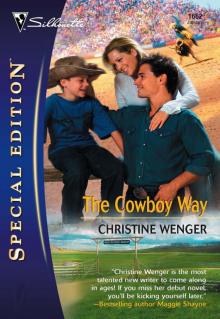 The Cowboy Way
The Cowboy Way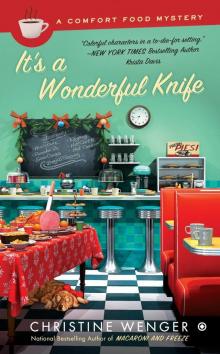 It's a Wonderful Knife
It's a Wonderful Knife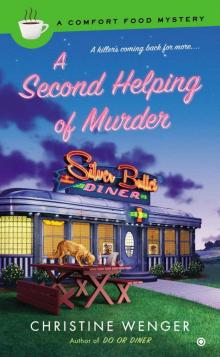 A Second Helping of Murder
A Second Helping of Murder The Cowboy Code
The Cowboy Code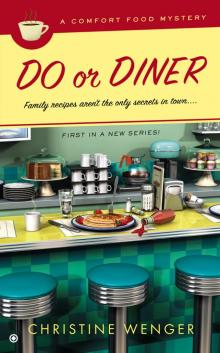 Do or Diner: A Comfort Food Mystery
Do or Diner: A Comfort Food Mystery Lassoed Into Marriage
Lassoed Into Marriage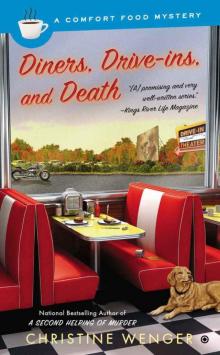 Diners, Drive-Ins, and Death: A Comfort Food Mystery
Diners, Drive-Ins, and Death: A Comfort Food Mystery Stuck On You
Stuck On You The Rancher's Surprise Son (Gold Buckle Cowboys Book 4)
The Rancher's Surprise Son (Gold Buckle Cowboys Book 4)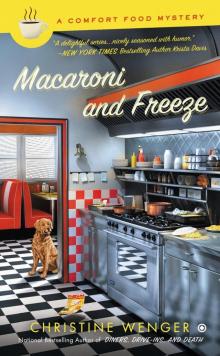 Macaroni and Freeze
Macaroni and Freeze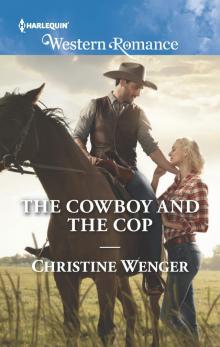 The Cowboy and the Cop
The Cowboy and the Cop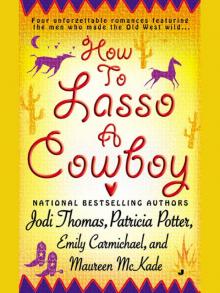 How to Lasso a Cowboy
How to Lasso a Cowboy Reunited with the Bull Rider
Reunited with the Bull Rider The Lady and the Cowboy
The Lady and the Cowboy